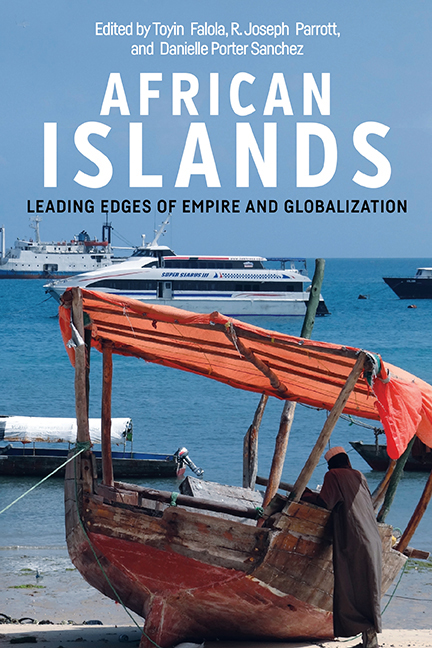Book contents
- Frontmatter
- Dedication
- Contents
- Introduction: Arbiters and Witnesses of Change: Contextualizing Conversations on African Islands
- Part 1 Atlantic Ocean Islands
- 1 The Canaries to Africa: The Atlantic Strategy of “To Be or Not to Be”
- 2 Sugar, Cocoa, and Oil: Economic Success and Failure in São Tomé and Príncipe from the Sixteenth to the Twenty-First Centuries
- 3 The Bijagos of Canhabac Island (Guinea-Bissau)
- 4 An Island in the Middle of Everywhere: Bioko under Colonial Domination
- 5 Cursing in Bioko and Annobón: Repeating Islands that Don't Repeat
- 6 African Ports and Islands during the Second World War
- 7 “Nos lingua, nos kultura, nos identidadi”: Postcolonial Language Planning and Promotion in Cabo Verde and the Cape Verdean Diaspora
- Part 2 Indian Ocean Islands
- Notes on Contributors
- Index
5 - Cursing in Bioko and Annobón: Repeating Islands that Don't Repeat
from Part 1 - Atlantic Ocean Islands
Published online by Cambridge University Press: 31 August 2019
- Frontmatter
- Dedication
- Contents
- Introduction: Arbiters and Witnesses of Change: Contextualizing Conversations on African Islands
- Part 1 Atlantic Ocean Islands
- 1 The Canaries to Africa: The Atlantic Strategy of “To Be or Not to Be”
- 2 Sugar, Cocoa, and Oil: Economic Success and Failure in São Tomé and Príncipe from the Sixteenth to the Twenty-First Centuries
- 3 The Bijagos of Canhabac Island (Guinea-Bissau)
- 4 An Island in the Middle of Everywhere: Bioko under Colonial Domination
- 5 Cursing in Bioko and Annobón: Repeating Islands that Don't Repeat
- 6 African Ports and Islands during the Second World War
- 7 “Nos lingua, nos kultura, nos identidadi”: Postcolonial Language Planning and Promotion in Cabo Verde and the Cape Verdean Diaspora
- Part 2 Indian Ocean Islands
- Notes on Contributors
- Index
Summary
All the infections that the sun sucks up
From bogs, fens, flats, on Prosper fall, and make him
By inchmeal a disease! His spirits hear me,
And yet I needs must curse.
—William Shakespeare, The TempestShakespeare's The Tempest is about the relations between two cultures: one imperial, the other a dependent island. There are many possible allegorical allusions to the area out of which Prospero and company are sailing, and one of them is the Spanish Empire. But the allegorical significance of Caliban (the island dweller) has much to do with the precivilized island where he resides. His relationship with Prospero is not a binary opposition, as both Shakespeare and certain proponents of postcolonial studies want to imply (in the former case unwittingly): to simply describe it as a relation of oppressor to oppressed, colonizer to colonized, civilized to uncivilized, dominator to dominated, speaker to voiceless would be to deny that complexity and the multifariousness of their interactions and symbolic importance.
In an oft-cited essay “Learning to Curse,” Stephen Greenblatt goes beyond the obvious social and historical relations between the two pivotal characters by centering his discussion of The Tempest on the act of cursing. Caliban rejects Prospero's gift of language as an act of defiance, and, as Shakespeare implies to us, his defiance is to speak on his own terms as he says to Prospero in one of his first speeches: “This island's mine … which thou tak'st from me.” And later on,
But they'll nor pinch,
Fright me with urchin-shows, pitch me I'th'mire;
Nor lead me, like a firebrand, in the dark
Out of my way.
(Shakespeare, The Tempest, act 2, scene 2, p. 65.)The alliteration of the p sound—the P of Prospero (“on Prosper fall”) as well as “pinch” and “pitch”—is Shakespeare's way of allowing his islander to curse, as he asserts that no one can lead him, that he shall go his own way.
Addressing myself to the theme of African islands, I want to emphasize (as does Greenblatt) the discursive aspect of the Caliban-Prospero relationship in terms of the island, its idea, both real and imaginary, by focusing on two islands, equally real and imaginary, in the Gulf of Guinea: Annobón and Bioko.
- Type
- Chapter
- Information
- African IslandsLeading Edges of Empire and Globalization, pp. 157 - 169Publisher: Boydell & BrewerPrint publication year: 2019

